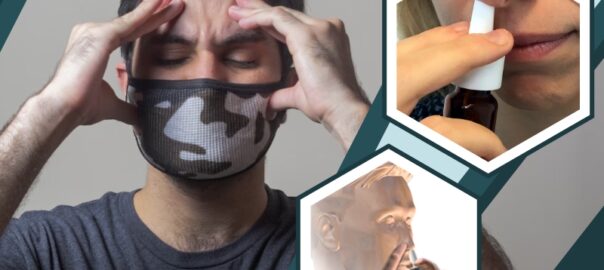When creating a migraine treatment plan with your doctor, you have many medication options. A fast-acting, effective way to deliver relief, nasal sprays are one form of migraine treatment to consider. Different types of nasal sprays help with migraine care. Which one will work best for you may depend on your specific symptoms and the stage of your migraine? The other treatments you use matter as well.
How Migraine Nasal Spray Works?
Nasal sprays for migraine can offer more rapid relief than oral medications. A 2013 research review showed that nasal sprays could begin to ease the symptoms of an acute migraine attack as quickly as 15 minutes. Generally speaking, medications given intranasally can be absorbed more rapidly and effectively than oral medications.
Your nasal cavity contains a high amount of blood vessels. It provides a more direct route for the drug into your bloodstream. When a drug is directly absorbed into your bloodstream, it avoids being broken down by your digestive system or your liver during first-pass metabolism. It means more of the drug is readily available to counteract your migraine symptoms.
Types of Migraine Nasal Spray
Three classes of medications are available as nasal sprays for treating ongoing migraine.
- Nasal Triptans (cause blood vessel narrowing)
- Nasal dihydroergotamine or DHE (a formulation of ergotamine, which also constricts blood vessels)
- Nasal ketorolac (a non-steroidal anti-inflammatory to prevent pain)
Nasal triptans and ergotamines are specifically approved to treat migraine. Ketorolac is U.S. Food and Drug Administration-approved to fight pain, but not specifically for migraine.
Recommended nasal spray that can be used for migraine:
- Sumatriptan Nasal Spray – this nasal spray is a triptan. When the blood vessels in your brain widen, it causes a headache. Sumatriptan works by tightening the blood vessels to relieve your migraine headache and stop pain signals from going to your brain.
How To Use Migraine Nasal Spray?
Like all acute treatments, nasal sprays work best when you take them as soon as you feel a migraine attack coming on. While you might be tempted to follow the advice the school nurse gave you when you got a nosebleed, you shouldn’t tip your head back. Doing so makes the medication drip down your throat and get absorbed by your stomach, which slows down the absorption process. For the same reason, try not to sniff too much while the spray is in your nose.
Since each user should administer a pre-measured amount of medication, you don’t need to worry much about dosage. Just be sure not to use the medication more often than directed.
Side Effects of Migraine Nasal Spray

Some people who use migraine nasal spray medications experience the following side effects:
- Unusual taste
- Dry mouth
- Pain, pressure, and tightness sensations (such as in the nose, throat, or chest)
- Tingling sensation, numbness, and skin sensitivity, especially around the nose
- Drowsiness, fatigue, or weakness
- Dizziness
- Nausea and vomiting
- Stuffy or runny nose
These are not all the possible side effects of nasal sprays. Patients should check the specific class of nasal spray for an exhaustive list of side effects and talk to their doctor about what to expect with treatment with nasal sprays.
Most of these medications should not be taken if you are pregnant, may become pregnant, or are nursing. They are also unsafe to take if you have heart problems, high blood pressure, circulatory problems, or kidney problems. Some of these medicines have been linked to life-threatening conditions when combined with certain protease inhibitors, anti-fungal medications, and certain antibiotics.
It is always important to read the warnings on the drug label to learn if you should avoid taking the drug and what you should discuss with your doctor. It would be best to begin with no medication or supplement without first checking with your healthcare provider and let them know of any other prescriptions, OTCs, and herbals you are taking to ensure no interactions.





